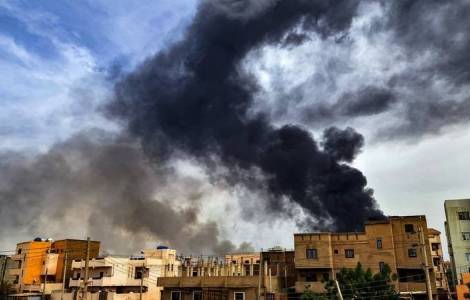
Khartoum (Agenzia Fides) - Around 16,000 dead and over 8 million displaced and refugees: the worst displacement crisis in the world. These figures illustrate the humanitarian tragedy of Sudan's forgotten war, which broke out exactly a year ago, on April 15, 2023, when, after months of tension, the approximately 300,000 regular army (SAF) led by General Abdel Fattah al-Burhan and the paramilitary militia of Rapid Support Forces (RSF) led by Mohamed Hamdan “Hemedti” Dagalo with around 100,000 men came into conflict (see Fides, 17/4/2023).
The disagreements were related to the integration of the RSF into the national army, in particular the timing of integration and the command and control structure. The conflict, which began in the capital Khartoum, soon spread to Darfur, the RSF's stronghold, and then to virtually the entire country. In Darfur, the war immediately took on an ethnic dimension, exposing unhealed wounds from the previous conflict in the early 2000s. The RSF grew out of the notorious Arab Janjaweed mounted fighters used by the previous regime of Omar al Bashir to suppress the non-Arab population in this vast region of western Sudan. The two warring parties, SAF and RSF, were then joined by the various armed groups already present in Sudan, joining one side or the other (see Fides, 21/11/2023).
The war has devastated the country's agriculture, adding to the above figures the approximately five million people who are at risk of starvation and the 18 million who are in serious food crisis. And food has become a weapon: both warring parties are preventing convoys carrying food aid sent by humanitarian organizations from traveling to areas controlled by the enemy. Allegations of serious human rights violations by the military and militias are increasing, including sexual violence, torture and mass executions. The two factions do not seem to want to sit down at the negotiating table because they both believe they can win the conflict. The outside support they both receive could also affect the calculations of the two rival leaders. The RSF is supported by Russian mercenaries from the former Wagner Group, from the United Arab Emirates, who send aid via the Central African Republic, Chad and Libyan Cyrenaica. The regular army, on the other hand, is supported by Egypt, Turkey and Iran (Iranian drones have recently been used to attack the the RSF), while the Ukrainian special forces occasionally release videos in which they meet Russian mercenaries supporting the RSF. In the Sudanese theater of war, in the midst of a never-ending humanitarian tragedy, a strange mix occurs. (L.M.) (Agenzia Fides, 15/4/2024)